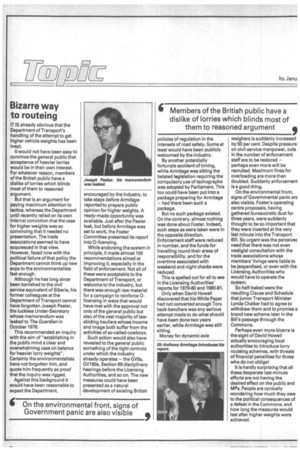Bizarre way to routeing
Page 42

If you've noticed an error in this article please click here to report it so we can fix it.
IT IS already obvious that the Department of Transport's handling of the attempt to get higher vehicle weights has been inept.
It would not have been easy to convince the general public that acceptance of heavier lorries would be in their own interest. For whatever reason, members of the British public have a dislike of lorries which blinds most of them to reasoned argument.
But that is an argument for paying maximum attention to tactics, whereas the Department until recently relied on its own internal conviction that the case for higher weights was so convincing that it needed no presentation. The trade associations seemed to have acquiesced in that view. However, faced now with the political failure of that policy the Department cannot think up new sops to the environmentalists fast enough.
Although he has long since been banished to the civil service equivalent of Siberia, his former colleagues at the Department of Transport cannot have forgotten Joseph Peeler, the luckless Under-Secretary whose memorandum was leaked to The Guardian in October 1978.
This recommended an inquiry with the aim of "establishing in the public mind a clear and overwhelming case on balance for heavier lorry weights". Certainly the environmentalists have not forgotten him, and quote him frequently as proof that the inquiry was rigged.
Against this background it would have been reasonable to expect the Department,
encouraged by the industry, to take steps before Armitage reported to prepare public opinion for higher weights. A ready-made opportunity was available. Just after the Peeler leak, but before Armitage was set to work, the Foster Committee presented its report into 0-licensing.
While endorsing the system in principle, it made almost 100 recommendations aimed at improving it, especially in the field of enforcement. Not all of these were acceptable to the Department of Transport, or welcome to the industry, but there was enough raw material for a campaign to reinforce 0licensing in ways that would have met with the approval not only of the general public but also of the vast majority of lawabiding hauliers whose income and image both suffer from the activities of so-called cowboys.
Such action would also have revealed to the general public something of the tight controls under which the industry already operates — the GV9s, GV160s, Section 69 disciplinary hearings before the Licensing Authorities, and so on. The new measures could have been presented as a natural development of existing British policies of regulation in the interests of road safety. Some at least would have been publicly welcomed by the industry.
By another potentially fortunate accident of timing, while Armitage was sitting the belated legislation requiring the compulsory use of tachographs was adopted by Parliament. This too could have been put into a package preparing for Armitage — had there been such a package.
But no such package existed. On the contrary, almost nothing was done about Foster. Indeed, such steps as were taken were in the opposite direction. Enforcement staff were reduced in number, and the funds for travelling round their areas of responsibility, and for the overtime associated with weekend and night checks were reduced.
This is spelled out for all to see in the Licensing Authorities' reports for 1979-80 and 1980-81.
Only when David Howell discovered that his White Paper had not converted enough Tory back-benchers was any serious attempt made to do what should have been done two years earlier, while Armitage was still sitting.
Money for dynamic axle weighers is suddenly increased by 50 per cent. Despite pressure on civil service manpower, cuts in the number of enforcement staff are to be restored — perhaps even more will be recruited. Maximum fines for overloading are more than doubled. Suddenly enforcement is a good thing.
On the environmental front, signs of Governmental panic are also visible. Foster's operating centre proposals, having gathered bureaucratic dust for three years, were suddenly thought to be so important that they were inserted at the very last minute into the Transport Bill. So urgent was the perceivec need that there was not even vestigial consultation with the trade associations whose members' livings were liable to be jeopardised, or even with the Licensing Authorities who would have to operate the system.
So half-baked were the resulting Clause and Schedule that junior Transport Minister Lynda Chalker had to agree to withdraw them and to promise a brand new scheme later in the Bill's passage through the Commons.
Perhaps even more bizarre is the sight of David Howell actually encouraging local authorities to introduce lorry routeing schemes, with threats of financial penalities for those who do not oblige!
It is hardly surprising that all these desperate last-minute efforts are not having the desired effect on the public and MPs. People are cynically wondering how much they owe to the political consequences of a defeat in the Commons, and how long the measures would last after higher weights were achieved.










































































